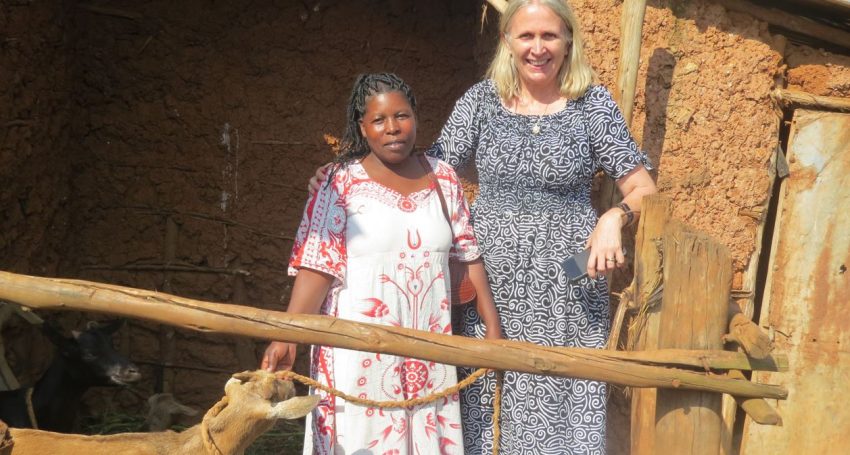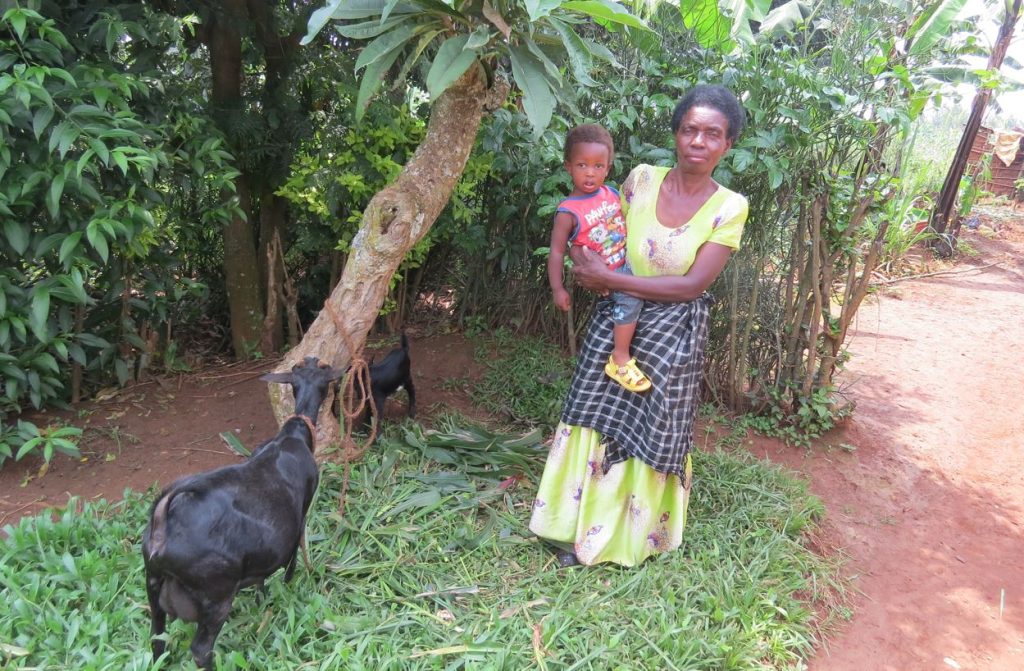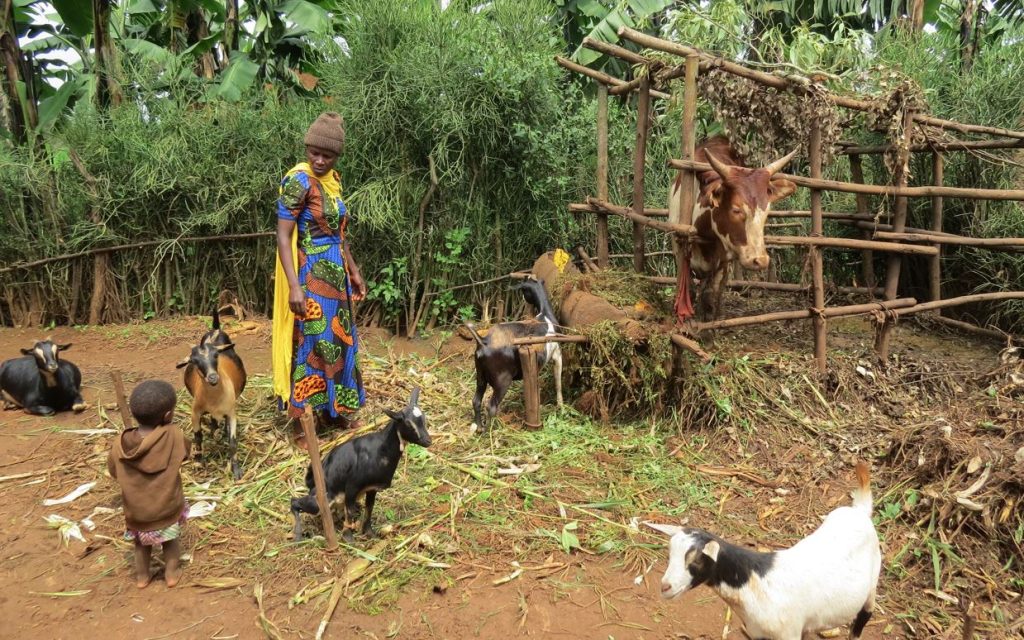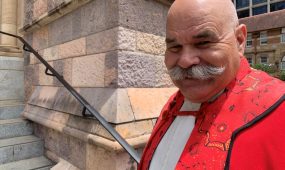Successful Rwandan goat programme funded by ACSQ Anglicans
Justice & Advocacy
“Every Rwandan goat owner shared a similar story about how their life was better now that they had the goats — their farm was producing more, they could pay school fees for their children, and they had dreams for other improvements…I accepted their thanks, but it didn’t belong to me. It belongs to Southern Queensland Anglicans who have given money to Brisbane-based Anglican Aid Abroad and made this grant possible,” says Sarah Gover

During the COVID lockdowns, I received a letter from a friend in Rwanda asking for help supporting some people in their local communities. She was the president of the Diocesan Mothers Union, Mumma Dianna, and was concerned about the impact of the pandemic on the most vulnerable families in their communities. The Government of Rwanda was helping with short-term needs, but donations for more substantive projects ran out without visitors.
We talked, and she told me that one of the projects they were keen to implement was a goat programme. I spoke to the then-chair of Brisbane-based Anglican Aid Abroad (AAA), The Rev’d Bruce Sligo, who encouraged me to help the Diocese of Gahini submit a grant application. AAA’s secretary, Marilyn Wright, helped guide me in the process, offering invaluable support and insight. AAA graciously granted the Diocese of Gahini $5,000 to buy goats, noting that the project fit well into their remit of assisting our partners in developing local skills and self-sufficiency. The money was sent over, but that is not where the story ends.
My husband, Dave, and I were privileged to attend the wedding of the eldest daughter of the Bishop of Gahini in Rwanda. You don’t get many opportunities to attend a traditional Rwandan wedding, so we saved some money and went. The wedding was epic. And after a few days, the Mumma Dianna said, “Now it’s time to see the goats.”

A woman with her grandson, from The Parish of Rukara, and their goats in Rwanda in December 2023
First I was informed about the programme. Mothers Union purchased 53 healthy adult goats with the grant. The goats were given to people from churches closest to the Cathedral. They didn’t want the vulnerable families to worry about paying for expensive transport for the goats, so by choosing local churches, all the goats could be walked or carried home (up to 10km) or taken on a bicycle or motorbike.
The local churches appointed a goat project manager who worked with the church and community leadership to identify the recipients. The poorest women in the community were selected, even if they didn’t have a connection to the church. Teen mums, families with disabled dads, grandparents raising grandkids and widows were the kinds of families the project focused on.
Advertisement
The primary help the goat gives a family is increasing garden production by providing improved fertiliser. Excess crops are sold at the local markets. Mothers Union and the Diocese supported horticulture improvements with regular farming classes to enhance the increased farm production.
Dairy goats also provide a precious protein source in the way of milk for families.
The women accepted the goats on the agreement they give the first kid to another vulnerable family. Most goats in the first group had twins, so they could give one and keep one. After this initial gifting, all subsequent baby goats are theirs to keep if they want. The family has the right to sell any of future baby goats, especially billy goats. A large goat can sell for $75 to $100, which is the equivalent of two to three weeks’ salary — or two semesters of school fees. Representatives of the Diocese told me how being in this programme changed how they ran other programmes.

A Rwandan family and their animals, including goats, from The Parish of Nyagahandagaza in December 2023
After hearing all about the programme, the Mothers Union President said, “Enough of the talking, it’s time to visit the goats.” It took us two days to visit just two thirds of the families involved in the programme. We drove from village to village. Our first stop in each village was the church to meet the parish project manager who explained more specifics about their goats. In most parishes two or three of the initial goats died in the first year due to sickness or dog attacks; however, most survived.
Advertisement
As soon as the summary was finished, often with a song, we would head back into the car and start visiting the goat owners. The recent rains had filled the potholes and turned the dirt roads to mud, making many of them impassable. We usually only got two to three kilometres beyond the church before we started walking down the muddy tracks in our “Sunday best”.
Every now and then a friendly face would stand outside the house welcoming us onto their property. We would be ushered into their backyard and invariably found two to eight goats happily munching away next to the goat owner, waiting to give us her heartfelt thanks. They thanked the local Mothers Union that helped think of her, while also thanking the Australian Anglicans who gave the money for the goats.
Every Rwandan goat owner shared a similar story about how their life was better now that they had the goats — their farm was producing more, they could pay school fees for their children, and they had dreams for other improvements. They had hope, and they were so very thankful. I accepted their thanks, but it didn’t belong to me. It belongs to Southern Queensland Anglicans who have given money to Brisbane-based Anglican Aid Abroad and made this grant possible.
So, thank you to the many in Southern Queensland who have given to this grant fund and other funds like it. I hope these photos show you the faces of the goat owners who now hope and dream of improving their lives, thanks to you.
Editor’s note: If you are able, please donate to Anglican Aid Abroad, which is a registered Brisbane-based charity. Visit the Anglican Aid Abroad website for more information.





